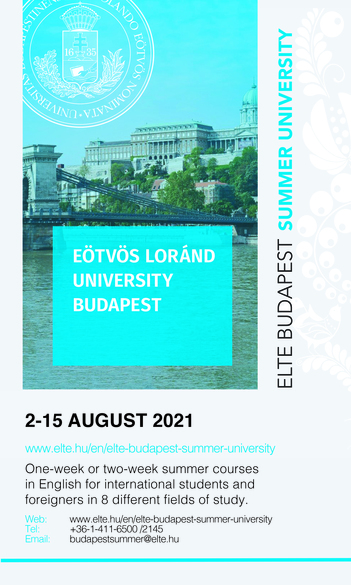The Rise and Fall of the Austro-Hungarian Monarchy: Central European Identity, Cosmopolitan Cities & Trianon

When? 02 - 15. 08. 2021.
Where? ONLINE
The course focuses on the short-lived, but imposing history of the Austro-Hungarian Empire. We examine how the mid-19th century political crisis in Central Europe resulted in the Austro-Hungarian Compromise of 1867, which opened up ways for the rise of a new empire in the continent. The newly established state faced multiple challenges, including ethnic diversity, uneven economic development, and political conflicts. Still, we can tell the story of Austria-Hungary’s dazzling march to a modernized empire with dual cosmopolitan cities, Vienna and Budapest, unique and rich cultural and academic life, lively tourism. We shall examine the role of the royal family, and the emperor, Franz Joseph and his beloved and popular wife, Elizabeth in this success.
Literature
Cornwall, Mark, ed. (2002) The Last Years of Austria-Hungary.
Hamann, Brigitte (1996) Hitler’s Vienna.
Hamann, Brigitte (2018) The Reluctant Empress: A Biography of Empress Elisabeth of Austria.
Palmer, Alan (1995) Twilight of the Habsburgs: The Life and Times of Emperor Francis Joseph.
Structure of the course
August 3: The establishment of the Austro-Hungarian Monarchy
Europe in the middle of the 19th century, political power relations, social processes, the effects of the Industrial Revolution. The foreign policy background of the formation of the Monarchy, the aspects of the Austrian and Hungarian sides. The role of key political figures, arguments and counter-arguments about the Monarchy. European reactions. The structure of the dualistic state, common affairs, economy, war, domestic and foreign policy.
August 4: The Last Habsburgs
1848 and the Habsburg Empire. A young man on the throne: Franz Joseph. The personality of the emperor, symbols of power, cohesive forces. A romantic marriage, Sissi at the court, cult of the Empress. The upbringing, traumas and tragedy of Rudolf, the Crown Prince of Austria. Emperor Miksa in Mexico. Ferenc Ferdinand’s adventurous journey around the world, his role in the Monarchy, his marriage, suitability, and symbolic death. The last ruler: IV. Charles, his experiments and failures.
August 5: Rush to war - humiliating defeat - after world burning
Europe at the turn of the century. Tensions, crises, anxieties and social conflicts. Retaining and pulling forces, war on the front and at the hinterland. National identities, propaganda, theatre of war. Peace dictatorships, social discontent, the unfinished war.
August 6: Vienna, Budapest, Prague: world cities in Central Europe
Urban development in the second half of the 19th century. Migrants, the structure of urban society. Central European cosmopolitan features, architecture, spatial structure, community and private functions. The Budapest of the Millennium. Vienna and Budapest - sister cities, parallels. Challenges of metropolitan life, deviance and crime.
August 9: The concept of Central European identity: theories, visions
Western, Eastern Europe and the intermediate region. History and geography, is there Central Europe? Kossuth, Jászi, Bibo, Jeno Szucs Hanak and theories. The basis of a common identity. Central European idea, opposition tradition. Central Europe in the 21st century. A real region or fantasy?
August 10: Central European peoples, ethnicities, minorities: coexistence and conflict
Ethnic map of the Austro-Hungarian Monarchy. Historical heritage, linguistic, religious, cultural boundaries. The formation of national consciousness, aspirations, the creation of the myth of the past. Assimilation efforts. Bases of common identity, conflicts.
August 11: The Jewish Question, Anti-Semitism
Judaism in the Austro-Hungarian Monarchy. Population movement in the second half of the 19th century, mass migration. Discrimination and integration, channels of upward mobility. Stereotypes, prejudices, anti-Semitism. Interpretation of Tiszaeszlár. Turn-of-the-century Vienna and Judaism, political anti-Semitism. Zionism.
Cultural diversity and integration
Cultural national consciousness, language, literature, history, folklore. National press and publicity, parallels and conflicts. National traditions, folklore, culture of peasant society. Operetta and cafe, music, entertainment, bindings.
August 12: Intellectuals, artists: the dynamics of cultural networks
Scientific and artistic careers, thoughts and groups, collaborations. Schools, the cultural roots of networks. Social background as context. The Monarchy as a living space. The world of music, operetta, Strauss, Lehar and Mahler. Central European novel and poetry. Ady and Kaffka, Central European values and symbols, common theme. Distinguish from East and West, the concept of the company. Topos, myths, heroic figures, literature as a pillar of national identity.
Back to ELTE Budapest Summer university 2021
E-mail: budapestsummer@elte.hu
Apply here
